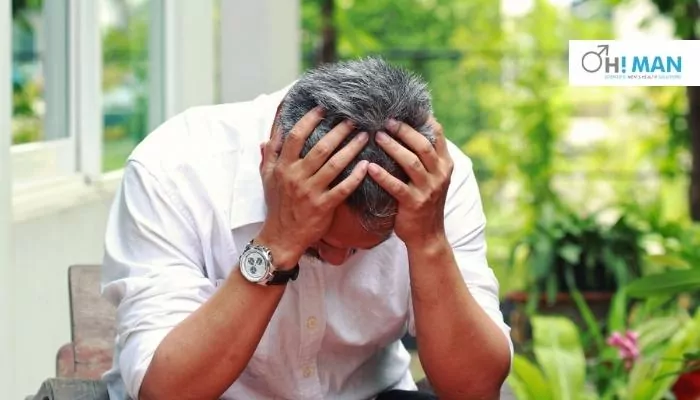Male Menopause: Symptoms, Causes & Different Treatment
Male Menopause: Symptoms, Causes & Different Treatment

Women are not the only ones to suffer the effects of hormone changes. Doctors see that men are also experiencing similar symptoms experienced by perimenopausal and menopausal women. The medical community still discusses whether or not men undergo a clearly defined male menopause phase as testosterone levels decrease.
However, aging still affects the male body, including testosterone levels that decrease regularly.
While aging influences sex-specific hormones in men, relating this process to female menopausal is incorrect.
Some researchers prefer to associate the symptoms with androgen decline in aging males (ADAM) or hypogonadism. Further, it occurs naturally as the gonads, the organs that make sexual cells, begin to decline in function and age.
The post below will look at the effects of ageing on men’s hormones and what are the possible treatments for male menopause.
Table of Content –
What Is Male Menopause?
Male menopause is the common name for andropause. So, it refers to changes that occur with age in the levels of male hormones. The same set of symptoms can also be referred to as androgen deficiency, testosterone deficiency, and late-onset hypogonadism.
Menopausal symptoms include a decrease in testosterone production for 50 or over. It’s usually associated with hypogonadism, and both of these conditions result in lower testosterone levels and similar symptoms.
Further, it is common for males to notice testosterone production drop. However, this is also the case when there is a condition like diabetes.
Alongside the decrease in testosterone, some males suffer from symptoms such as:
- Weakness
- Fatigue
- Depression
- Sexual issues
The connection of these symptoms with lower testosterone levels is still uncertain.
In contrast to women who go through menopausal symptoms and menopausal women, where hormone production ceases completely, the decline of testosterone for men is a more gradual process. In contrast to the Ovaries, the testes are not out of the hormone required to make testosterone. Healthy men might be able to produce testosterone well into their 80s and even later.
However, due to illness, small changes in the functions of the testes can be noticed as early as 45 – 50. Additionally, more pronounced after age 70 for some men.

The Symptoms Of Andropause Male Menopause
The conditions people refer to menopausal symptoms appear more slowly and gradually and are less severe than menopausal.
Further, the decline in testosterone levels, also known as the male hormone, is less significant than the decrease in estrogen levels for women going through menopause.
The many indications and symptoms that some believe are due to menopausal changes are:
- Hot flashes in men
- Irritability and moodiness
- excess fat accumulation in the abdomen area and around the chest.
- diminution of muscular mass
- thin, dry skin
- excessive sweating
- Low energy
- sadness or depression
- lower motivation
- lower confidence in oneself
- trouble having trouble concentrating
- sleep problems or insomnia
- Increased body fat
- diminished muscle mass and the feeling of physical weakness
- decreased sexual libido or Low Libido
- reduced bone density
- erectile dysfunction
- Gynecomastia
There may be swelling and tender breasts. You may also experience a decrease in testicle size and hair loss on your body. Additionally, low levels of testosterone and osteoporosis have a connection, and it is a condition in which your bones are fragile.
All these symptoms are rare and usually affect men around the same time as women who are entering menopause.
Causes Of Male Menopause
When a man reaches thirty, testosterone levels slowly decrease by about 1 per cent per year.
But, doctors do not believe that the usual decline in testosterone levels due to age is the cause of the male menopause symptoms in men.
The condition is multifaceted and can cause various symptoms in different individuals. While these symptoms often occur in older men with declining testosterone levels, they tend to occur in older males with obesity, heart disease, high blood pressure, and type 2 diabetes.
So this suggests that changes in testosterone levels may not be the only cause of this condition.
Other risk factors include health issues, like:
- lack of exercise
- excessive smoking
- heavy alcohol consumption
- stress
- anxiety
- no sleep

Diagnosis & Treatment Of Men Menopause
To diagnose menopausal “menopause,” the doctor will:
- Conduct a physical exam
- Talk to your doctor about any symptoms
- Take tests to rule out any medical issues that could be the reason behind the problem.
- Take blood tests. These could include measuring testosterone levels.
As the condition does not have a defined definition, people who suffer from these physical changes will be treated according to the symptoms they experience.
An obese person might need assistance in managing weight and an exercise program. They may also need to alter their eating habits and adhere to a well-balanced and healthy diet.
People with diabetes and cardiovascular diseases require appropriate treatment for the cause. Monitoring blood glucose levels can decrease the symptoms.
The doctors will thoroughly examine symptoms, such as fatigue and erectile dysfunction, to determine if a cardiovascular condition may be present, such as through scans and blood tests.
They could refer someone suffering from anxiety or depression to a psychiatrist or psychologist who may recommend antidepressant psychotherapy, antidepressants medicines like sildenafil, or both.
A doctor might recommend testosterone replacement therapy, but the efficacy of this treatment isn’t particular. Further, testosterone therapy might increase the risks of a blockage in the urinary tract and prostate cancer, and it can also cause epilepsy, ischemic heart disease and sleep apnea.
If your physician suggests using hormone replacement therapies, you should weigh all the benefits and negatives before choosing.
Bottom Line
There seem to be no evidence to determine “male menopause” as a medically diagnosed condition.
But, ADAM can signify a testosterone deficiency, a male sex hormone that may have similar effects as “male menopause”. Low testosterone levels may be challenging and manifest differently for different people.
Doctors do not diagnose male menopause.
Yet, a lifestyle that involves an appropriate diet, regular exercise, and alcohol and tobacco in a limited way can boost the sense of well-being. Further, this could also reduce any symptoms relating to aging in men.
The treatment of the underlying condition can lessen the adverse effects. Since no evidence or research suggests the prevalence or occurrence of male menopause, don’t fall prey to any medication that claims to treat men menopause.
If any of these symptoms concern you or you are worried about erectile dysfunction or premature ejaculation, you must consult a doctor. At Ohman, we have experienced specialists who can treat a wide range of men’s sexual problems that affect their lives. For consulting our doctors, all you need is to schedule an online consultation. Ohman offers private and confidential consultation, and our doctors can provide an accurate prescription for your condition. Additionally, you can search for these medications at the Ohman’s online store, and you will receive your medicines at your doorstep.
Frequently Asked Questions
How do you get rid of male menopause?
Menopausal symptoms include a decrease in testosterone production for 50 or over. It’s usually associated with hypogonadism, and both conditions are associated with lower testosterone levels and similar symptoms.
The most frequently prescribed hormone treatment will be Testosterone Replacement Therapy, TRT. TRT is used to treat various symptoms caused by testosterone deficiency or male menopausal.
Some other steps you can take include:
- eat a healthy diet.
- Get regular exercise.
- Sleep enough.
- Reduce your stress.
What is the male version of menopause called?
The male version of menopause is andropause.
How Long Does male menopause last?
Male menopausal is a gradual adjustment phase as the body adapts to the lower amounts of testosterone. According to specific sources, menopausal discomfort can last for 20 years.



